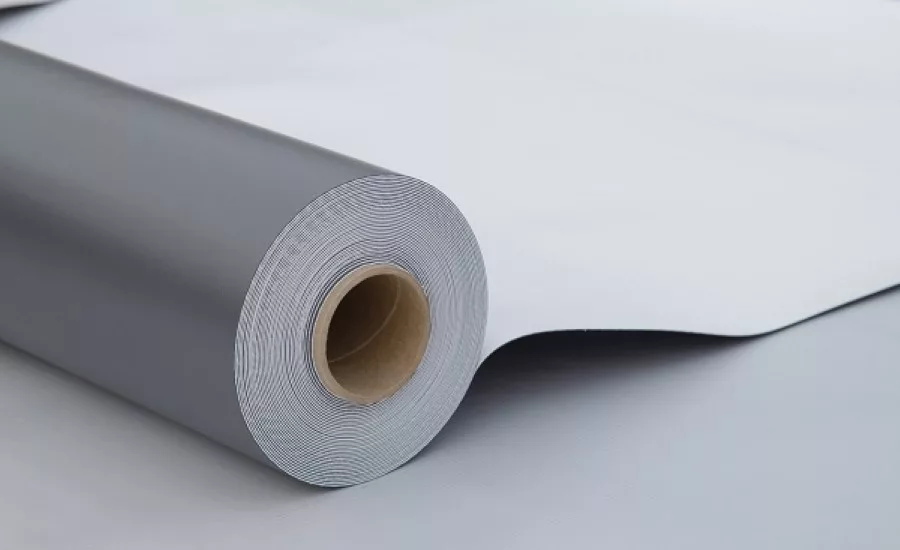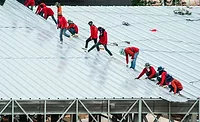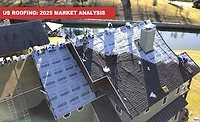Regulatory News
Vinyl Institute Says It Will Work with EPA on Vinyl Chloride Risk Evaluation
A mainstay of the construction industry comes under scrutiny by regulators

The construction industry is the largest consumer of PVC, accounting for about 60–70% of its total consumption, according to MDPI, a publisher of peer-reviewed, open-access journals with a focus on robust and rapid editorial processes. PVC is a versatile, cost-effective material that is replacing traditional building materials like wood, concrete, and metals. It is also resistant to harsh environments and is considered ideal for roofing.
— Photo courtesy of DERFLEX
The Vinyl Institute, America’s leading trade group representing vinyl product manufacturers, responded last week to an announcement by the U.S. Environmental Protection Agency that vinyl chloride will be one of the next five chemicals selected for prioritization under the Toxic Substances Control Act.
Below is a statement to be attributed to Ned Monroe, president and CEO of the Vinyl Institute:
"Vinyl Institute and our members are fully prepared to work with the EPA during both prioritization and risk evaluation of vinyl chloride. The Agency's prioritization of vinyl chloride is no surprise to us because it has been part of EPA's work plan since 2012.
“The Vinyl Institute has indicated our strong interest to be engaged in the process early, and to serve as a collaborative resource for the Agency to proactively identify and address any information needs that would expedite a high-quality risk evaluation.
"The Vinyl Institute is already supporting the risk evaluation process for other substances under review by EPA. As the Agency has noted, selection for prioritization is not a finding that an unreasonable risk is presented, but the start of a multi-year review process to assess potential risks.
"There is an extensive body of research and data about vinyl chloride that will support the prioritization and risk evaluation process. This is an opportunity to correct any misunderstanding about the regulation of vinyl chloride manufacturing and the safety of PVC products.
"We believe this risk evaluation will further assure that the production of vinyl chloride and use of PVC products are safe. Manufacturers of vinyl chloride adhere to some of the most stringent safety and environmental regulations in the chemical industry.
"The greatest potential for vinyl chloride exposure is for workers at vinyl chloride monomer and PVC production facilities. In the mid-1970s, the industry implemented closed-loop technology and both OSHA and EPA enacted regulations to effectively protect American workers, and downstream users, of American-made PVC."

What is Vinyl Chloride and Why it Matters
Vinyl chloride is used to make polyvinyl chloride, commonly known by its acronym PVC, a hard plastic resin used in roofing and other applications.
PVC is a white, single-ply membrane used in both residential and commercial roofing. It is a durable, flexible material that is commonly used for commercial properties. PVC is available in large sheets for flat roofs and shingles for slanted roofs.
PVC is a popular flat roofing material because it is durable, resistant to chemicals and fire, and easy to install. It is also a good option for flat roofs over living spaces because it reflects heat instead of absorbing it.
PVC membranes are available in various colors, thicknesses, widths, and reinforcements. The average life expectancy of a PVC roof is up to 30 years.
According to the Centers for Disease Control and Prevention, vinyl chloride can irritate the eyes, mucous membranes, and the respiratory tract. Escaping compressed gas or liquid can cause frostbite or irritation of the skin and eyes. Chronic exposure can cause permanent liver injury and liver cancer, neurologic or behavioral symptoms, and changes to the skin and bones of the hand.
The Vinyl Institute, founded in 1982, is the principal trade association representing the leading manufacturers of vinyl, vinyl chloride monomers, vinyl additives, and modifiers. The group works on behalf of its members to promote the benefits of the world's most “versatile plastic,” used to make everything from PVC piping to flooring, roofing and vinyl siding.
The vinyl industry in the United States employs over 350,000 employees at nearly 3,000 facilities and generates an economic value of $54 billion, according to the group.
For more information, visit vinylinfo.org.
Looking for a reprint of this article?
From high-res PDFs to custom plaques, order your copy today!







